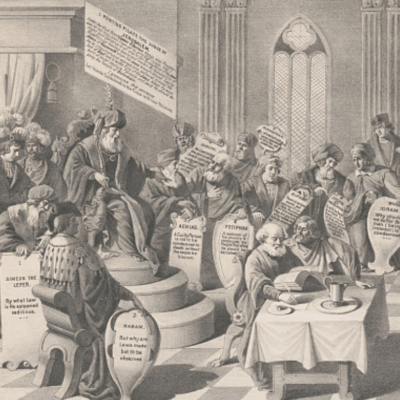If we let him thus alone, all men will believe on him: and the Romans shall come and take away both our place and nation.
John 11: 48
[And the Romans shall come.] I could easily believe that the fathers of the Sanhedrim had either a knowledge or at least some suspicion that Jesus was the true Messiah.
I. This seems plainly intimated by the words of the vine-dressers in the parable, Mark 12:7; “This is the heir; come, let us kill him.” They knew well enough he was the heir: and it was come to this in the struggle betwixt them, Either he will inherit with his doctrine, or we will with ours: come therefore, let us kill him, and the inheritance shall be ours.
II. They could not but know that Daniel’s weeks were now fully accomplished, and that the time of the Messiah’s appearing was now come. This that conflux of Jews from all nations into Jerusalem, Acts_2, doth testify, being led by Daniel’s prophecy, and the agreeableness of the time, to fix their residence there, in expectation of the Messiah now ready to be revealed. Compare also Luke 19:2.
III. When therefore they saw Jesus working miracles so very stupendous, and so worthy the character of the Messiah, and that in the very time wherein the manifestation of the Messiah had been foretold, they could not but have a strong suspicion that this was He. But then it is a wonderful thing that they should endeavour his death and destruction. What! Destroy the Messiah, the expectation and desire of that nation!
Such mischiefs could religious zeal persuade.
But it was a most irreligious religion, made up of traditions and human inventions; a strange kind of bewitchery rather than religion; that they should choose rather that the Messiah should be cut off than that religion be changed. They had been taught, or rather seduced by their traditions to believe, 1. That the kingdom of the Messiah should be administered in all imaginable pomp and worldly glory. 2. That their Judaism, or the religion properly so called, should be wonderfully promoted by him, confirmed, and made very glorious. 3. The whole nation should be redeemed from the heathen yoke. But when he, who by the force of his miracles asserted himself so far to be the Messiah, that they could not but inwardly acknowledge it, appeared notwithstanding so poor and contemptible, that nothing could be less expected or hoped for of such a one than a deliverance from their present mean and slavish state; and so distant seemed he from it, that he advised to pay tribute to Caesar, taught things contrary to what the scribes and Pharisees had principled them in, shook and seemed to abrogate the religion itself, and they had no prospect at all of better things from him; let Jesus perish, though he were the true Messiah, for any thing that they cared, rather than Judaism and their religion should be abolished.
Let us therefore frame their words into this paraphrase: “It does seem that this man can be no other than the true Messiah; the strange wonders he doth, speak no less. What must we do in this case? On the one hand, it were a base and unworthy part of us to kill the Messiah: but then, on the other hand, it is infinitely hazardous for us to admit him: for all men will believe on him; and then our religion is at an end; and when that is once gone, what can we look for less than that our whole nation should perish under the arms and fury of the Romans?”
“’I beg your pardon for that,’ saith Caiaphas; ’you know nothing, neither consider; for, be he the Messiah or be he not, it is expedient, nay, it is necessary, he should die rather than the whole nation should perish,’ ” etc…
The greatest work of the Messiah, according to the expectation of the Jews, was the reduction or gathering together the captivities. The high priest despairs that ever Jesus, should he live, could do this. For all that he either did or taught seemed to have a contrary tendency, viz. to seduce the people from their religion, rather than recover them from their servile state of bondage. So that he apprehended this one only remedy left, that care might be taken, so as by the death of this man the hazard of that nation’s ruin might blow over: “If he be the Messiah (which I almost think even Caiaphas himself did not much question), since he can have no hope of redeeming the nation, let him die for it himself, that it perish not upon his account.”
Thus miserably are the great masters of wisdom deceived in almost all their surmises; they expect the gathering together of the children of God in one by the life of the Messiah, which was to be accomplished by his death. They believe their traditional religion was the establishment of that nation; whereas it became its overthrow. They think to secure themselves by the death of Christ, when by that very death of his their expected security was chiefly shaken. O blind and stupid madness!
– John Lightfoot (of the Westminster Assembly), “Commentary on John 11”, https://www.studylight.org/commentaries/eng/jlc/john-11.html. 1675.




One Comment
Thanks for posting this, Dakota. It’s really amazing and wonderful that the Father’s decree was accomplished by the very devices of the wicked one deceiving the nations gathered against His Son. They meant it for evil but He meant it for good.
Commenting has been turned off.